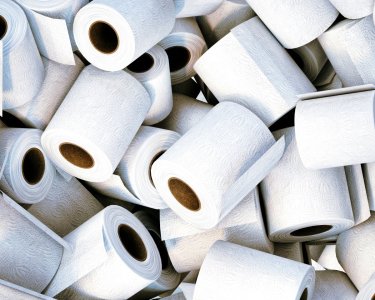Are you ready to ditch toilet paper forever?
- Replies 2
Let’s be honest: for most, the idea of life without toilet paper sounds about as likely as giving up coffee or never watching another rerun of your favorite show.
But believe it or not, the humble roll of TP—an American bathroom staple for over a century—might soon be headed for the history books.
Why? Because a wave of new (and not-so-new) alternatives is sweeping the globe, promising cleaner, greener, and even more comfortable ways to take care of business.
So, what’s behind this bathroom revolution, and what could possibly replace your beloved toilet paper?
Grab a seat (pun intended), and let’s explore the future of personal hygiene—one flush at a time.
Why Are We Flushing Away Toilet Paper?
First, let’s talk about why this change is even on the table. According to experts and environmental advocates, there are three big reasons:
Environmental Concerns
Americans use an astonishing amount of toilet paper—about one roll per week or 50 rolls per person, per year! That adds up to billions of rolls, millions of trees, and a whole lot of water and energy for manufacturing and transportation.

As per Cottonelle, the average person goes to the toilet 5 times a day, but anything from four to 10 times is deemed “normal.” So, the average person is said to use around seven sheets per wipe.
Specifically, “6.41 sheets per toileting occasion for women, and 8.1 sheets per occasion for men.” Not to mention, most toilet paper is single-use and ends up in landfills or sewage systems.
Health Implications:
While toilet paper gets the job done, it’s not always the gentlest option—especially for those with sensitive skin or certain health conditions. Some people experience irritation, and let’s face it, dry paper isn’t always the most thorough cleaning method.
Cultural Preferences:
Believe it or not, much of the world already gets by just fine without toilet paper. In Europe, Asia, and the Middle East, other methods have been the norm for centuries.
Also read: This woman’s horrifying public bathroom story will make you think twice—here’s how to protect yourself!
Meet the Bidet: The Bathroom Upgrade You Never Knew You Needed
If you’ve traveled abroad, you might have encountered the bidet—a bathroom fixture that’s been quietly revolutionizing hygiene since the 17th century.
The bidet uses a gentle stream of water to clean up after you go, eliminating the need for paper altogether. "These standalone fixtures use precisely directed water streams for cleaning, eliminating the need for paper products entirely," stated Think Stewartville.
Meanwhile, the Cambridge Dictionary defines the bidet as a "small, low bath in which a person washes the lower part of their body." So, think of it as a mini-shower for your nether regions.
Bidets come in all shapes and sizes, from standalone porcelain basins to high-tech toilet seat attachments with adjustable water pressure, temperature, and even air-drying features.
Source: Hello TUSHY Bidet / Youtube.
Some modern bidets even have heated seats and night lights—talk about luxury!
Reusable Cloth Toilet Paper: The “Family Cloth” Comeback
If bidets aren't your thing, there are other rising alternatives to traditional toilet paper. One such option is reusable cloth toilet paper, which is seen as a more eco-friendly choice.
"Typically crafted from organic cotton or bamboo fibers, these washable squares provide a soft, effective cleaning option," according to Think Stewartville.
Besides helping the environment, they may also help reduce household expenses.
Also read: A hidden risk in public restrooms—should you check the toilet paper first?
However, some question the cleanliness of reusable cloth toilet paper. Healthline advises washing the cloth "in a hot-water laundry cycle that's at least 160°F (71°C) for at least 25 minutes, or a sanitize setting if you have one."
They also note a drawback: "it can retain stains that make the cloths appear undesirable to use."
Source: Net Zero Co. / Youtube.
Tips for Making the Switch
1. Start small: Try a bidet attachment or a pack of reusable cloths alongside your regular toilet paper.
2. Talk to your household: Make sure everyone’s on board and comfortable with the new routine.
3. Keep an open mind: It might feel strange at first, but many people find they prefer the new methods after a short adjustment period.
Read next: Butt seriously: Experts share the best way to wipe

Have you tried a bidet or reusable cloth toilet paper? Are you curious, skeptical, or ready to make the leap? Share your thoughts, experiences, and questions in the comments below!
But believe it or not, the humble roll of TP—an American bathroom staple for over a century—might soon be headed for the history books.
Why? Because a wave of new (and not-so-new) alternatives is sweeping the globe, promising cleaner, greener, and even more comfortable ways to take care of business.
So, what’s behind this bathroom revolution, and what could possibly replace your beloved toilet paper?
Grab a seat (pun intended), and let’s explore the future of personal hygiene—one flush at a time.
Why Are We Flushing Away Toilet Paper?
First, let’s talk about why this change is even on the table. According to experts and environmental advocates, there are three big reasons:
Environmental Concerns
Americans use an astonishing amount of toilet paper—about one roll per week or 50 rolls per person, per year! That adds up to billions of rolls, millions of trees, and a whole lot of water and energy for manufacturing and transportation.

Environmental concerns, health implications, and cultural preferences are driving the move towards alternatives to toilet paper. Image source: Colourblind Kevin / Unsplash.
As per Cottonelle, the average person goes to the toilet 5 times a day, but anything from four to 10 times is deemed “normal.” So, the average person is said to use around seven sheets per wipe.
Specifically, “6.41 sheets per toileting occasion for women, and 8.1 sheets per occasion for men.” Not to mention, most toilet paper is single-use and ends up in landfills or sewage systems.
Health Implications:
While toilet paper gets the job done, it’s not always the gentlest option—especially for those with sensitive skin or certain health conditions. Some people experience irritation, and let’s face it, dry paper isn’t always the most thorough cleaning method.
Cultural Preferences:
Believe it or not, much of the world already gets by just fine without toilet paper. In Europe, Asia, and the Middle East, other methods have been the norm for centuries.
Also read: This woman’s horrifying public bathroom story will make you think twice—here’s how to protect yourself!
Meet the Bidet: The Bathroom Upgrade You Never Knew You Needed
If you’ve traveled abroad, you might have encountered the bidet—a bathroom fixture that’s been quietly revolutionizing hygiene since the 17th century.
The bidet uses a gentle stream of water to clean up after you go, eliminating the need for paper altogether. "These standalone fixtures use precisely directed water streams for cleaning, eliminating the need for paper products entirely," stated Think Stewartville.
Meanwhile, the Cambridge Dictionary defines the bidet as a "small, low bath in which a person washes the lower part of their body." So, think of it as a mini-shower for your nether regions.
Bidets come in all shapes and sizes, from standalone porcelain basins to high-tech toilet seat attachments with adjustable water pressure, temperature, and even air-drying features.
Source: Hello TUSHY Bidet / Youtube.
Some modern bidets even have heated seats and night lights—talk about luxury!
Reusable Cloth Toilet Paper: The “Family Cloth” Comeback
If bidets aren't your thing, there are other rising alternatives to traditional toilet paper. One such option is reusable cloth toilet paper, which is seen as a more eco-friendly choice.
"Typically crafted from organic cotton or bamboo fibers, these washable squares provide a soft, effective cleaning option," according to Think Stewartville.
Besides helping the environment, they may also help reduce household expenses.
Also read: A hidden risk in public restrooms—should you check the toilet paper first?
However, some question the cleanliness of reusable cloth toilet paper. Healthline advises washing the cloth "in a hot-water laundry cycle that's at least 160°F (71°C) for at least 25 minutes, or a sanitize setting if you have one."
They also note a drawback: "it can retain stains that make the cloths appear undesirable to use."
Source: Net Zero Co. / Youtube.
Tips for Making the Switch
1. Start small: Try a bidet attachment or a pack of reusable cloths alongside your regular toilet paper.
2. Talk to your household: Make sure everyone’s on board and comfortable with the new routine.
3. Keep an open mind: It might feel strange at first, but many people find they prefer the new methods after a short adjustment period.
Read next: Butt seriously: Experts share the best way to wipe
Key Takeaways
- Environmental concerns, health implications, and cultural preferences are driving the move towards alternatives to toilet paper.
- Bidets are the most established and widely used alternative, using water to clean instead of paper.
- Reusable cloth toilet paper made from organic cotton or bamboo is gaining popularity as a more environmentally-friendly and cost-effective option.
- There are some concerns about the hygiene and appearance of reusable cloth toilet paper, which requires thorough washing at high temperatures to keep clean.
Have you tried a bidet or reusable cloth toilet paper? Are you curious, skeptical, or ready to make the leap? Share your thoughts, experiences, and questions in the comments below!






